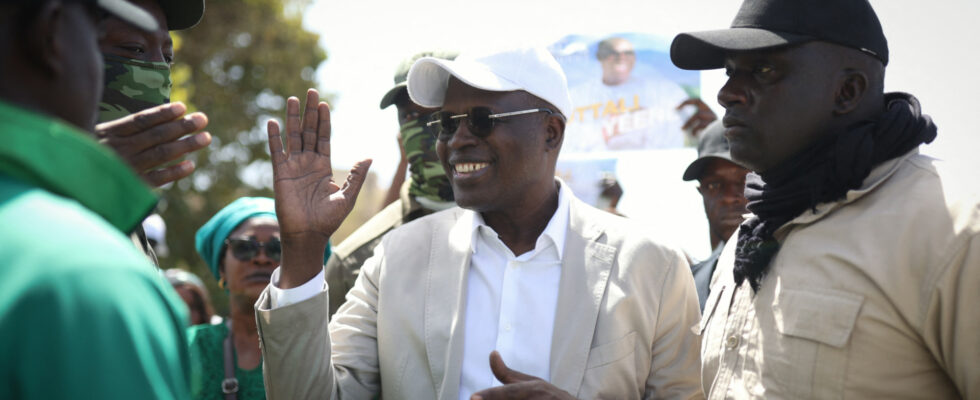Senegal entered the campaign on Saturday, a two-week sprint to emerge from a month of crisis and choose its fifth president, in an election indecisive like never before. The Senegalese were supposed to vote on February 25. President Macky Sall caused a national commotion by postponing the vote on February 3, just before the opening of the campaign. Nothing like that this time. At the cost of demonstrations which left four dead and a showdown with twists and turns between the Head of State, the National Assembly and the Constitutional Council, the calendar is now stabilized: the vote will take place on the 24th and the campaign will end on the 22nd at midnight. The date of a probable second round has not been set.
One of the main candidates in the election and former mayor of Dakar, Khalifa Sall, launched his campaign Saturday afternoon with a tour of several neighborhoods in the capital. A few hundred sympathizers, who had patiently awaited his arrival in a festive atmosphere, to the sounds of percussionists and songs broadcast at full volume from large speakers, welcomed him with a joyous uproar, with applause.
A campaign reduced to two weeks
The battle of recent weeks has tested the country’s attachment to democratic practice, battered by the succession of power grabs elsewhere in the region. The election will be followed abroad much more closely than it would be in another country of 18 million inhabitants, among the bottom 30 in the world on the UN Human Development Index, but which should begin to produce hydrocarbons in 2024.
With the start of the campaign, the Senegalese will be able to gather freely throughout the territory around the 18 men and one woman who are all seeking a first term. Debates and messages will abound in the media, under the control of bodies ensuring equality of speaking time.
The campaign is inevitably reduced from three to two weeks. It will largely be held during the Muslim fasting month. Many Senegalese expressed to AFP their impatience to vote and turn the page. Competitors who still do not know the exact date of the election in the middle of the week must be prepared for the most urgent matters.
Bassirou Diomaye Faye begins the race behind bars
The Senegalese are going ahead with the vote with the same candidates as before the postponement, with the exception of one competitor who was forced to withdraw. No more today than then does a candidate stand out, and today, as then, one of the favorites, the anti-system Bassirou Diomaye Faye, begins the race behind bars. This is the first time that the incumbent has not presented himself in the election. President Sall designated the man who was his Prime Minister a few days ago, Amadou Ba, as the candidate for his camp. Amadou Ba claims Macky Sall’s record.
While the continent is engaged in intense strategic competition and Russia is strengthening its positions among its Sahelian neighbors facing jihadism, President Sall has maintained strong relations with the West. But the major projects undertaken by “Macky” have not benefited everyone, and the record to be defended is also that of recent difficult years due to Covid-19 and the Ukrainian crisis, and this is the start in a canoe of tens of thousands of Senegalese for Europe.
No one is guaranteed to be in the second round
Amadou Ba said he was aiming for a victory in the first round. This is also what the Bassirou Diomaye Faye camp promises. Detained since April 2023, he can hope to benefit from the amnesty law adopted in the excitement of recent weeks and relating to the violence committed during several episodes of deadly protests since 2021. His possible release from prison, or even that of his leader Ousmane Sonko, considered more charismatic, but also imprisoned and disqualified from the presidential election, could electrify their camp’s campaign.
While awaiting his possible release, Bassirou Diomaye Faye’s coalition was to present its program to the press on Saturday afternoon. Ousmane Sonko’s speech against the elites, the multinationals and the influence exercised, according to him, by France resonates with a very young part of the population. Khalifa Sall and former Prime Minister Idrissa Seck are also cited as contenders. But no one is guaranteed to be in the second round, analysts agree.
